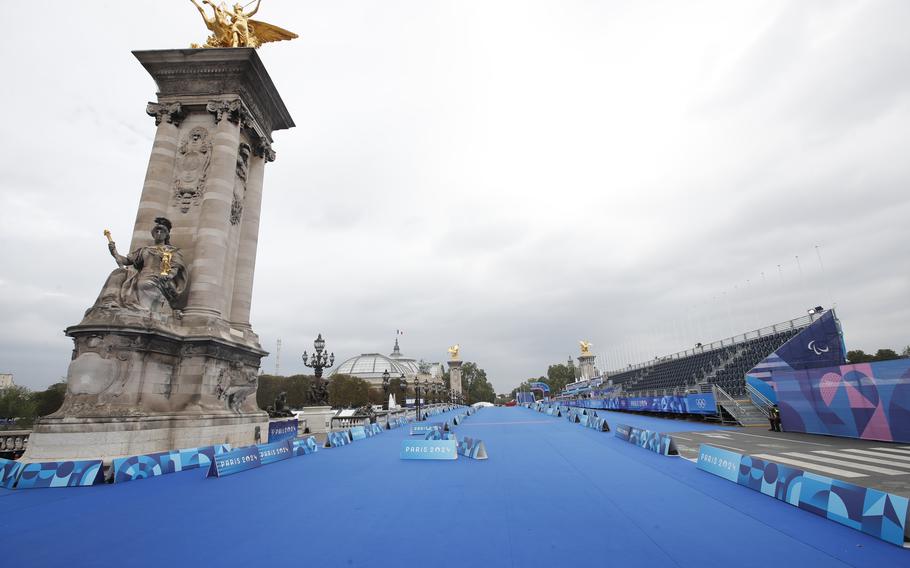
The Alexandre III bridge, used for the Para Triathlon, ahead of the Paralympic Games, Tuesday, Aug. 20, 2024 in Paris. (Aurelien Morissard/AP)
PARIS — Dmytro Melnyk and Yevhenii Korinets had never crossed paths on the battlefield as soldiers in Ukraine’s war against Russia, but they joined for the first time as teammates in sitting volleyball at the Paralympics on Friday. Side by side, they defended their net and dove for loose balls, and even after Ukraine lost in three sets to Iran, Melnyk and Korinets walked together to one end of North Paris Arena to greet hundreds in the crowd waving the blue and yellow flags of their home country.
Melnyk and Korinets raised their hands and clapped along with the fans. They are among 140 athletes in Paris this week representing Ukraine, which is considered a Paralympic superpower and has competitors in 17 sports, many of whom have been uprooted from their homes and normal training centers since Russia’s invasion in February 2022.
Melnyk and Korinets are the only two members of their 12-player team to serve in the war and have taken different paths to Paris: Melnyk, whose left leg is three inches shorter than his right, long has been a fixture for the national team and was allowed to take a leave from his combat post to compete in Paris. Korinets’s left leg was amputated at the hip after he was wounded while serving as a combat medic in the war last year. He took up sitting volleyball as part of his recovery.
“It’s an honor for me and very important in a time of war that we can show the whole world that we can still keep training, and keep improving,” Korinets said through an interpreter. “And show the world that we can keep fighting for the country, for the honor of the country.”
Just 12 days ago, Melnyk was in command of his infantry platoon in the key highland town of Chasiv Yar in the eastern Donetsk region, where the Ukrainians have waged fierce battles against the Russians for months. It took Melnyk nearly a year to convince the military to allow him to fight after the war started because of his disability; he lied a “little bit” about his impairment to do so, he said. He started as a drone operator and eventually was deployed as an infantry captain on the front lines in the eastern regions of the country.
Melnyk competed for the national team during the Rio Paralympics in 2016 and has continued to train near the front lines during his service in preparation for Paris, but when a reporter asked him Friday about the reprieve, he said he was at the Paralympics simply to compete with his team.
“Who told you I am okay, or changed my mind, or adjusted to the new environment? I’m just hoping to support my team because this is my second family,” he said through an interpreter. “I want to be useful and do my best to help them as far as I can.”
Around the time Melnyk joined the military, Korinets had become a member of the national team after being wounded in a battle in Bakhmut in March 2023. In another life, before the war started, Korinets had worked as a physiotherapist for children. When his left leg was amputated, he decided to take up sitting volleyball, which requires athletes to remain seated and move around the court using the power of their arms.
In his Paralympic debut, Korinets appeared as if he had been playing the sport for years. He was all over the court against Iran. He leaned over the sideline boundary to save a ball and set up a spike to tie the score early. When his shot sailed over his opponents’ heads later in the match, his teammates rushed to Korinets and put their arms around him; one of them handed him his arm crutches when he checked out of the game.
Melnyk helped lead a comeback in the third set, blocking shots at the net and setting up several points. He slammed his hands on the court with the rest of the Ukrainian players each time they scored.
“We are so happy that he could play with us and share this moment,” Korinets said of Melnyk. “Because he was with the team for many, many years and dedicated himself to Paralympic sport. We’re really proud to share this moment together, with him.”
Melnyk and Korinets stayed on the court for several minutes afterward to soak up the atmosphere from crowd. Still, their minds were back home.
Melnyk’s team was waiting in the bowels of the arena as he met with media from all over the world. After 10 minutes, he finally told everyone he had time for only one more question.
“How many men and women does he have under his command?” a reporter finally asked. Melnyk answered in his native language. His interpreter began to tremble as she explained his answer.
“He has 35 people under his command. From here, he didn’t call them because they don’t have no reception of the signal,” she said, before taking a short pause.
“And he really hopes that when he comes back, there will still be 35 people,” she said, her voice cracking. She stopped the interview and began to cry.
Melnyk grabbed her hand, and together they walked back toward Korinets and the rest of their team.